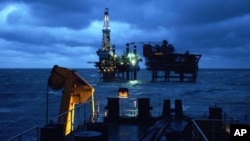The Chinese government is stepping up its pressure on the companies involved in an oil spill in the Bohai Bay, with calls for a thorough investigation into the incident and a limit on new construction in the bay.
On Thursday, Chinese media prominently featured Premier Wen Jiabao’s calls for a probe into the oil spill in the Bohai Bay.
Wen heads the State Council, which issued a statement calling for parties responsible for the accident to contain the oil spill and clean up the results.
The oilfield where the spill occurred is operated by ConocoPhillips China, a joint venture between U.S. firm ConocoPhillips and the state-owned China National Offshore Oil Corporation.
Hours earlier, ConocoPhillips said it would create a fund to offset damages caused by the spill. Chinese media say no amount was mentioned.
When asked for the Chinese government’s reaction to the ConocoPhillips announcement, Foreign Ministry spokesman Liu Weimin called this a trade issue, not a diplomatic one.
Liu says relevant authorities will address this case according to what he describes as “normal procedures.”
The Chinese government stopped short of blaming any company by name, but Wang Yamin, an associate professor with Shandong University’s College of the Ocean, is more direct.
Wang says he thinks ConocoPhillips ignored environmental regulations and was only concerned about extracting oil and, therefore is responsible for causing the oil spill.
He especially praised the State Council edict for limiting more industrial projects in the Bohai Bay area. He says the region has a fragile ecosystem that is already being overexploited.
He says the environmental deterioration already is alarmingly severe and has not yet reached its limit. He says, if the current trend continues, the Bohai will become a dead sea.
Fishermen in Shandong, Hebei and Liaoning provinces, which border Bohai, say that leaking oil has killed a large part of this year’s seafood harvest.
The leaking began in June at the offshore Penglai 19-3 oil field. Since then, Chinese authorities say about 700 barrels of oil and 2,500 barrels of drilling mud have leaked into the bay.
This compares to nearly five million barrels of oil released into the Gulf of Mexico from last year’s Deepwater Horizon spill.
ConocoPhillips owns a 49-percent in the Penglai oilfield, while CNOOC owns the remainder.
China Orders Investigation into Bohai Bay Oil Spill










